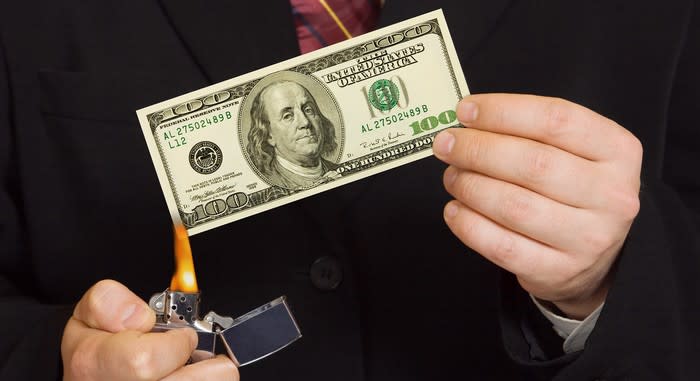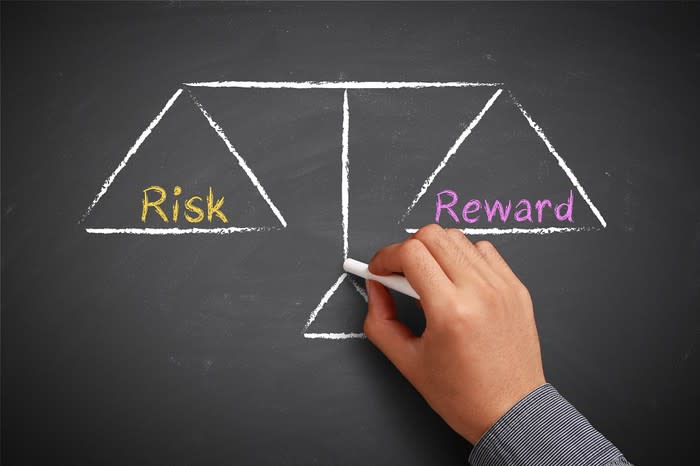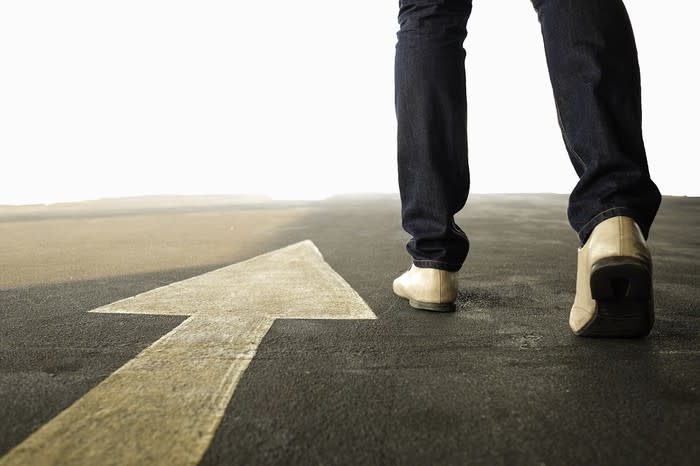I Lost $34,000 This Week: Here's What I'm Doing About It
It's been an ugly month for investors. Since the S&P 500 reached its all-time (so far) high in July, the market has fallen nearly 5.5% and news headlines are filled with words like "crash" and "fear." The world's economy seems to be at a tipping point. Economic growth is slowing around the world, and many fear that the ongoing U.S.-China trade fight could prove the straw that breaks the camel's back, tipping the world into recession.
The past week has been particularly concerning, and I've personally felt the impact of the market's turmoil. At market close on Aug. 15, my family's combined portfolio had lost a painful $34,000 since Monday, falling substantially more than the market's average over the same period.

It's felt like this for a lot of people lately. Image source: Getty Images.
I don't know about you, but $34,000 is a lot of money for me and my family, and it's not easy watching that much real wealth evaporate into thin air.
What happened to my money?
Without making too fine a point about it, my portfolio got pummeled. It was in part due to timing -- earnings season corresponding with the economic uncertainty that's driving the news cycle. But it's also the product of how I've chosen to invest.
My portfolio is heavily weighted to growth stocks. Here are five of my largest individual stock investments and how they performed over the past week:
Company | Sector | Returns From Aug. 12 to Aug. 16 |
|---|---|---|
NV5 Global | Infrastructure engineering | (7.2%) |
The Trade Desk | Online advertising | (8.7%) |
MercadoLibre | E-commerce | (8.8%) |
Vestas Wind Systems | Energy (wind turbine maker) | (8.9%) |
Clean Energy Fuels Corp. | Energy (natural gas and renewable natural gas for transportation supplier) | (13%) |
Returns as of 2:30 P.M. EDT on Aug. 16, 2019.
Without getting too deep in the weeds on my personal investments, suffice it to say that these five stocks are pretty representative of how a substantial portion of my portfolio moved this week.
It's actually even worse...
While the past week has been painful, the beating didn't actually begin this past Monday. If you go back to July 15, when the S&P 500 peaked, every single one of these stocks has fallen even more -- in some cases substantially -- than the table above shows.
And that's translated over to my entire portfolio. Since that day, my portfolio has lost more than $90,000 in value, and far underperformed the stock market average over that period.
Here's what I'm doing about it
In short, nothing outside of my existing investing plan. These kinds of weeks -- and even months -- are well within what I expect to see happen. This is what stocks do.
Let me give you a little context to explain why I'm willing to subject myself to this pain. I'm 42 (my wife's the same age) and the vast majority of our portfolio is invested in retirement accounts. And since we are both nearly a quarter century away from retirement age, these losses don't really affect my financial situation, at least not in a way that has me rethinking what I own and how I invest.

Image source: Getty Images.
That's because I have a fundamental understanding that stocks will almost certainly prove to be the best way to grow my wealth over the next two-plus decades, and the only way to attain those returns is to ride out volatility without letting fear take the reins and cause me to sell at the worst time: when my portfolio has lost value.
To the contrary, I've taken advantage of these sell-offs and been a buyer over the past month.
Moreover, I have measurable evidence that this strategy works. For more than a decade, I've measured my returns using the Motley Fool My Scorecard tool to track my portfolio. According to that tool, I have enjoyed an average 13.8% annualized rate of total returns. Over the same period -- and weighted for each transaction I've made -- the S&P 500 has averaged just under 10% in total returns. My portfolio hasn't only outperformed the market by almost 40%, it's also more than tripled the returns bonds would have earned me.
In other words, if I'd let fear of a non-risk for me -- short-term volatility -- affect my investing strategy, my portfolio would be substantially smaller today. Play that out over the next 25 years, and I would likely arrive at retirement without enough wealth to enjoy the quality of life I want.

Know where you're going and how you can best get there. Image source: Getty Images.
What about you?
I'm not trying to be dismissive of the big -- and real -- decline in my portfolio over the past month. I'm also not trying to make light of anyone else who's experienced the same thing and decided to sell their stocks.
It's a heck of a lot easier to say you'll ride out volatility than it is to actually do it. That's particularly true for anyone who's closer to retirement.
The lesson I hope people take away from this isn't just "ride it out." Our very human nature makes it nearly impossible to watch our wealth shrink without doing something.
So do something. Make a plan and use it. That includes making sure you own the right assets based on your goals and timeline. If you're closing in on retirement, owning only stocks could be a mistake, at least with wealth you'll need to pay the bills in the next four or five years. In your case, stock market volatility is a real risk, and bonds can help you avoid unexpected -- and unpredictable -- short-term losses.
If you really want to build long-term wealth, owning stocks needs to be part of your plan. But you also need to develop a plan that will make it easier to avoid hitting the "sell" button when the market is in turmoil. It's easier said than done, but I'm living proof that you can do it, too.
Jason Hall owns shares of Clean Energy Fuels, MercadoLibre, NV5 Global, The Trade Desk, and Vestas Wind Systems ADR. The Motley Fool owns shares of and recommends MercadoLibre, NV5 Global, and The Trade Desk. The Motley Fool has the following options: long January 2020 $60 calls on The Trade Desk and short January 2020 $125 calls on The Trade Desk. The Motley Fool recommends Clean Energy Fuels. The Motley Fool has a disclosure policy.
This article was originally published on Fool.com

 Yahoo Finance
Yahoo Finance 